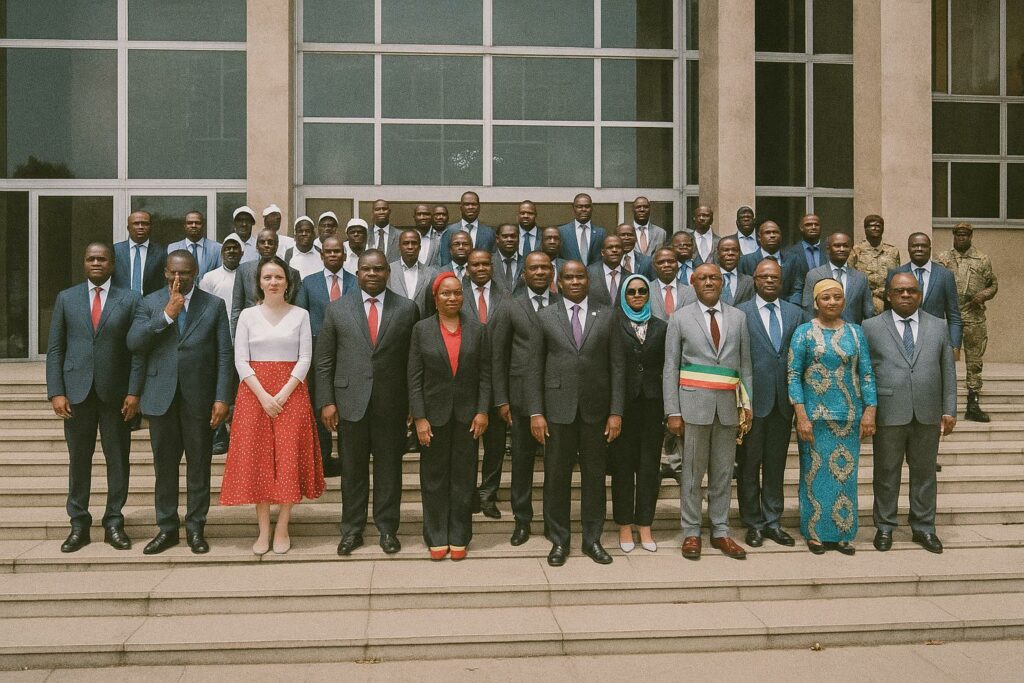A Demographic Pivot With Diplomatic Resonance
With more than one million Congolese citizens between twenty and thirty-nine years of age, Brazzaville occupies a delicate position on the continental chessboard. Its youthful cohort, accounting for roughly thirty per cent of the total population, represents both promise and pressure. From recent African Development Bank briefings to UNESCO’s Global Education Monitoring Report, interlocutors uniformly concur that states failing to harness this demographic dividend will encounter social tension and lost growth. By convening high-level ‘assises’ on 1 July, Prime Minister Anatole Collinet Makosso placed Congo in a camp of nations that prefer anticipatory governance over reactive firefighting.
Strategic Continuity Under Presidential Guidance
The conference’s timing is not accidental. President Denis Sassou Nguesso, whose Plan national de développement 2022-2026 emphasises human-capital formation, declared 2025 the extension of 2024, signalling policy continuity. Rather than unveiling a new doctrine, authorities doubled-down on existing pillars: education modernisation, entrepreneurial incubation and digital infrastructure. Such iterative stewardship, often overlooked in headline-driven commentary, reassures international partners who value predictability in project finance.
Campus-to-Market Pathways: The Missing Middle
At the centre of deliberations stood a candid acknowledgement: Congolese diplomas, though academically rigorous, sometimes struggle to translate into bankable skills. The Minister of Higher Education, Professor Delphine Edith Emmanuelle, emphasised the francophone scientific diplomacy manifesto, which reframes universities as laboratories for market solutions rather than ivory towers. Her ministry’s alignment with the Council of African and Malagasy Higher Education’s call for professionalisation speaks to a regional consensus that theory must travel off campus.
Stakeholders therefore advocated structured apprenticeships, dual curricula and university-industry research chairs. The proposed mechanisms echo the International Labour Organization’s 2022 recommendations for youth in resource-rich economies, where diversified skill sets counter commodity-price volatility. If implemented rigorously, these measures could redress the so-called ‘missing middle’ of small and medium enterprises that elsewhere account for seventy per cent of net job creation (World Bank, 2023).
Finance, Not Philanthropy: Recalibrating Capital Flows
The entrepreneurial impulse cannot mature without oxygen in the form of credit. Commercial banks, still largely oriented toward extractive conglomerates, have shown caution toward start-ups with limited collateral. To mitigate the perception of risk, Brazzaville’s authorities reiterated the activation of a sovereign guarantee fund first announced in 2022, while courting regional development finance institutions for blended-finance windows. Private investors, for their part, request regulatory clarity. Here the Prime Minister’s assurance that forthcoming decrees will streamline business registration, reduce customs delays and digitise tax filings resonates with the African Continental Free Trade Area’s ethos of frictionless commerce.
Initial signs are promising. The Congolese subsidiary of a leading pan-African mobile-money operator unveiled a micro-credit line pegged to transaction history rather than physical collateral, an innovation applauded by youth delegates during the forum. Such market-led instruments complement state incentives, illustrating that entrepreneurship thrives when public and private incentives converge rather than compete.
Societal Ownership Beyond Officialdom
A recurrent refrain from student leader Garly Chèrubin Will-Rudel Ibara captured the forum’s affective undercurrent. Addressing ministers and rectors, he insisted that students ‘no longer wish merely to be counted but to build and transform.’ His statement echoes findings of the 2023 Afrobarometer survey, which lists joblessness as the foremost concern among Congolese respondents. By granting the youth voice a central seat at the table, the government recognises that policy legitimacy today emanates as much from participatory optics as from technocratic soundness.
Civil-society organisations, including women-led cooperatives from Pool and Cuvette, provided empirical testimony of micro-enterprise resilience during the pandemic downturn. Their narratives, recorded by local think-tank CERAPE, supply qualitative ballast to macro-economic projections, reminding planners that entrepreneurship is as cultural as it is commercial.
Toward Measurable Outcomes and Regional Spill-Over
Diplomats stationed in Brazzaville will monitor concrete deliverables emerging from the assises. Authorities have pledged a performance dashboard tracking start-up survival rates, apprenticeship placements and female participation. Such metrics, if published quarterly, could bolster investor confidence and provide peer-learning templates for neighbouring states navigating analogous demographic bulges. The Congo River corridor already serves as a commercial artery linking Kinshasa and Brazzaville; a vibrant entrepreneurial ecosystem on one bank could exert positive contagion across the water.
Moreover, Brazzaville’s hosting of the 2026 Francophone Games offers a time-bound milestone for showcasing youth-led enterprises in agri-business, digital services and creative industries. Aligning policy targets with an international event imbues reform with a diplomatic showcase dimension, an approach similar to Rwanda’s leveraging of the Commonwealth Heads of Government Meeting in 2022.
Consolidating a Quiet Transformation
Congo-Brazzaville’s pivot toward youth entrepreneurship may lack the fanfare of headline-grabbing mega-projects, yet its cumulative effects could prove more transformative. By methodically lowering entry barriers, marrying academic content to market demand and broadening access to finance, Brazzaville nudges its young citizens from job-seekers to job-creators. International partners will invariably scrutinise execution, but the strategic intent now appears unequivocal. In a region where demographic momentum can either nourish prosperity or ferment discontent, Congo’s leadership signals that it has chosen the path of pragmatic optimism.

